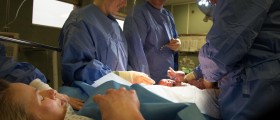
Obesity is a concept that is a little hard to define it essentially means dangerously overweight, and is most commonly measured through a person's Body Mass Index. This system has flaws, but it is generally obvious when someone is obese. The medical community has become more aware of the risks of obesity during pregnancy and birth, and a number of interesting studies on both topics are available from various countries. During childbirth, obesity can have the following negative effects:
There is an increased risk of "failure to progress", when the cervix doesn't dilate further over a long period of time. There is higher chances of shoulder dystocia, when the baby's shoulder gets stuck behind the mother's pelvis. There is a higher chance of the need for an emergency cesarean section as well as a higher rate of c-section complications. With Vaginal Birth after Cesarean patients, there are also higher risks of complications among the obese.In addition, obese mothers may have trouble gaining access to adequate pain relief during labor epidural anesthesia can physically be difficult to place. Electronic fetal monitoring is also harder to perform when the mother is obese. While the mentioned points don't look that "scary", the risks are real. A maternal deaths inquiry in Great Britain looking into deaths in childbirth between 2003 and 2005 found that half of those who died were overweight. Most of those were obese, with 15 percent being extremely obese.
Gwyneth Lewis, director of the maternal deaths inquiry, warned: "Healthy mothers have healthier pregnancies and healthier babies. The fact that more than half of the women who died were obese or overweight, and that preventable causes of cardiac disease were the leading cause of death, shows that strong public health messages are needed both before and during pregnancy."













_f_280x120.jpg)


Your thoughts on this
Loading...